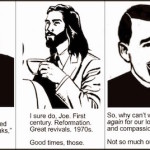We run our website the way we wished the whole internet worked: we provide high quality original content with no ads. We are funded solely by your direct support. Please consider supporting this project.

Conservatives and Liberals in the Same Kingdom
Jesus did not allow the world to set the terms for what he did. For instance, he called Matthew, a tax collector, as well as Simon, a zealot, to be his disciples. Tax collectors were on the farthest right wing of Jewish politics, zealots on the farthest left. In fact, zealots despised tax collectors even more than they despised the Romans, sometimes even assassinating them.
Yet Matthew and Simon spent three years together while following Jesus. In the accounts of Gospels, we never find a word about their different political opinions. Indeed, we never read a word about what Jesus thought about their radically different kingdom-of-the-world views.
This silence suggests that they had something in common that dwarfed their individual political differences. To be sure, Jesus’ life and teachings would undoubtedly transform the trust both had in their political views if they would allow it. At the very least, the tax collector would no longer cheat his clients—as they often did—and the zealot would no longer kill. Yet Jesus invited them to follow him as they were, prior to their transformation, and their widely divergent political views were never a point of contention.
What are we to make, then, of the fact that the church is largely divided along political lines? While Jesus never sided with any of the limited and divisive kingdom-of-the-world options of his day, the church today, by and large, swallows them hook, line, and sinker. Indeed, in some circles, whether conservative or liberal, taking particular public stands on social, ethical, and political issues, and siding with particular political or social ideologies, is the litmus test of one’s orthodoxy.
When this happens, it is evidence that the church is co-opted by the world. It means that we have lost our distinctive kingdom-of-God vision and abandoned our mission. It tells the world that we’ve allowed the world to define us, set our agenda, and define the terms of our engagement with it.
We must once again seek wisdom from above (James 3:17), the wisdom Jesus consistently displayed that will help us discern a unique kingdom-of-God approach to issues that will empower our moving beyond the stalemates and tit-for-tat conflicts that characterize the kingdom of the world.
We must embrace the simplicity of the kingdom of God. We must remember, if ever we were taught, the simple principle that the kingdom of God looks like Jesus and that our sole task as kingdom people is to mimic the love he revealed on Calvary. We have to a large degree gone AWOL on the kingdom of God, allowing it to be reduced to a religious version of the world. The world supplies the options, and in direct contradiction to Jesus’ example, we think it’s our job to pronounce which one God thinks is right.
But Jesus calls us and empowers us to follow his example by taking the more difficult, less obvious, much slower, and more painful road—the Calvary road. It is the road of self-sacrificial love. This changes everything, for both conservatives and for liberals.
—Adapted from The Myth of a Christian Nation, pages 62-65
Photo via VisualHunt
Related Reading

In a democracy, don’t Christians have a responsibility to participate in politics?
Question: You’ve argued that Christians shouldn’t try to gain power in government on the grounds that Jesus didn’t try to gain power in the political system of his day. But his government didn’t allow for such power. Caesar and Pilate weren’t elected by anyone. Our government allows for this. So don’t we have a responsibility…

Greg and Bruxy Pulpit Swap
Greg Boyd and Bruxy Cavey swapped pulpits last weekend. Here are a couple of clips to give you an idea of what each of them offered. You can access the full sermons here and here.

Love Conquers All
Paul prayed in this way for the church at Ephesus: I pray that, according to the riches of his glory, [God] may grant that you may be strengthened in your inner being with power through his Spirit, and that Christ may dwell in your hearts through faith, as you are being rooted and grounded in…

The Politics of Demonization
Jonathan Martin posted a blog this week that we wanted to share called the politics of demonization (demonic talk on immigration, & other things). Have you noticed the hateful ways that we characterize the “other” in public discourse? Jonathan suspects (and we agree) that there’s a powerful force driving this tendency in all of us. As he puts it…

Love and Free Will
God could have easily created a world in which nothing evil could ever happen. But this world would not have been capable of love. God could have preprogrammed agents to say loving things and to act in loving ways. He could even have preprogrammed these automatons to believe they were choosing to love. But these…

